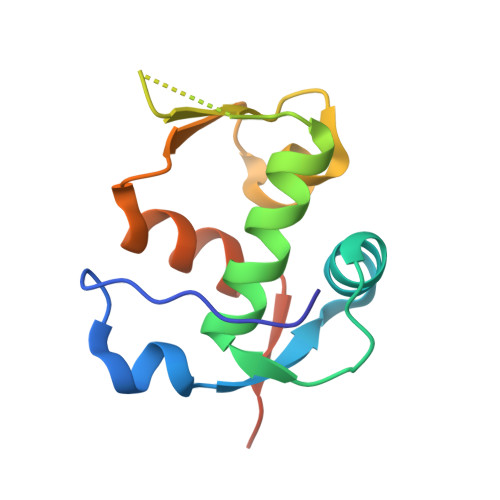SAR405838: an optimized inhibitor of MDM2-p53 interaction that induces complete and durable tumor regression.
Wang, S., Sun, W., Zhao, Y., McEachern, D., Meaux, I., Barriere, C., Stuckey, J.A., Meagher, J.L., Bai, L., Liu, L., Hoffman-Luca, C.G., Lu, J., Shangary, S., Yu, S., Bernard, D., Aguilar, A., Dos-Santos, O., Besret, L., Guerif, S., Pannier, P., Gorge-Bernat, D., Debussche, L.(2014) Cancer Res 74: 5855-5865
- PubMed: 25145672
- DOI: https://doi.org/10.1158/0008-5472.CAN-14-0799
- Primary Citation of Related Structures:
5TRF - PubMed Abstract:
Blocking the oncoprotein murine double minute 2 (MDM2)-p53 protein-protein interaction has long been considered to offer a broad cancer therapeutic strategy, despite the potential risks of selecting tumors harboring p53 mutations that escape MDM2 control. In this study, we report a novel small-molecule inhibitor of the MDM2-p53 interaction, SAR405838 (MI-77301), that has been advanced into phase I clinical trials. SAR405838 binds to MDM2 with K(i) = 0.88 nmol/L and has high specificity over other proteins. A cocrystal structure of the SAR405838:MDM2 complex shows that, in addition to mimicking three key p53 amino acid residues, the inhibitor captures additional interactions not observed in the p53-MDM2 complex and induces refolding of the short, unstructured MDM2 N-terminal region to achieve its high affinity. SAR405838 effectively activates wild-type p53 in vitro and in xenograft tumor tissue of leukemia and solid tumors, leading to p53-dependent cell-cycle arrest and/or apoptosis. At well-tolerated dose schedules, SAR405838 achieves either durable tumor regression or complete tumor growth inhibition in mouse xenograft models of SJSA-1 osteosarcoma, RS4;11 acute leukemia, LNCaP prostate cancer, and HCT-116 colon cancer. Remarkably, a single oral dose of SAR405838 is sufficient to achieve complete tumor regression in the SJSA-1 model. Mechanistically, robust transcriptional upregulation of PUMA induced by SAR405838 results in strong apoptosis in tumor tissue, leading to complete tumor regression. Our findings provide a preclinical basis upon which to evaluate SAR405838 as a therapeutic agent in patients whose tumors retain wild-type p53.
Organizational Affiliation:
University of Michigan Comprehensive Cancer Center, University of Michigan, Ann Arbor, Michigan. Department of Internal Medicine, University of Michigan, Ann Arbor, Michigan. Department of Pharmacology, University of Michigan, Ann Arbor, Michigan. Department of Medicinal Chemistry, University of Michigan, Ann Arbor, Michigan. shaomeng@umich.edu.


























